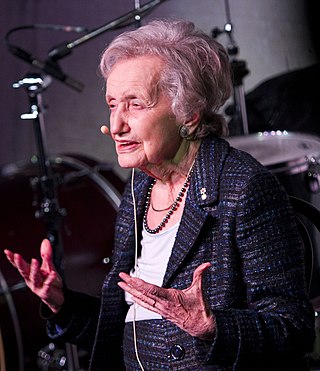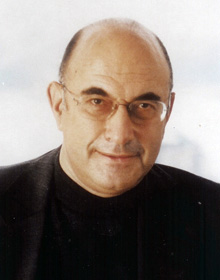
Cognitive neuroscience is the scientific field that is concerned with the study of the biological processes and aspects that underlie cognition, with a specific focus on the neural connections in the brain which are involved in mental processes. It addresses the questions of how cognitive activities are affected or controlled by neural circuits in the brain. Cognitive neuroscience is a branch of both neuroscience and psychology, overlapping with disciplines such as behavioral neuroscience, cognitive psychology, physiological psychology and affective neuroscience. Cognitive neuroscience relies upon theories in cognitive science coupled with evidence from neurobiology, and computational modeling.

Cognitive neuropsychology is a branch of cognitive psychology that aims to understand how the structure and function of the brain relates to specific psychological processes. Cognitive psychology is the science that looks at how mental processes are responsible for the cognitive abilities to store and produce new memories, produce language, recognize people and objects, as well as our ability to reason and problem solve. Cognitive neuropsychology places a particular emphasis on studying the cognitive effects of brain injury or neurological illness with a view to inferring models of normal cognitive functioning. Evidence is based on case studies of individual brain damaged patients who show deficits in brain areas and from patients who exhibit double dissociations. Double dissociations involve two patients and two tasks. One patient is impaired at one task but normal on the other, while the other patient is normal on the first task and impaired on the other. For example, patient A would be poor at reading printed words while still being normal at understanding spoken words, while the patient B would be normal at understanding written words and be poor at understanding spoken words. Scientists can interpret this information to explain how there is a single cognitive module for word comprehension. From studies like these, researchers infer that different areas of the brain are highly specialised. Cognitive neuropsychology can be distinguished from cognitive neuroscience, which is also interested in brain-damaged patients, but is particularly focused on uncovering the neural mechanisms underlying cognitive processes.
Social cognition is a topic within psychology that focuses on how people process, store, and apply information about other people and social situations. It focuses on the role that cognitive processes play in social interactions.

The frontal lobe is the largest of the four major lobes of the brain in mammals, and is located at the front of each cerebral hemisphere. It is parted from the parietal lobe by a groove between tissues called the central sulcus and from the temporal lobe by a deeper groove called the lateral sulcus. The most anterior rounded part of the frontal lobe is known as the frontal pole, one of the three poles of the cerebrum.

Brenda Milner is a British-Canadian neuropsychologist who has contributed extensively to the research literature on various topics in the field of clinical neuropsychology. Milner is a professor in the Department of Neurology and Neurosurgery at McGill University and a professor of Psychology at the Montreal Neurological Institute. As of 2020, she holds more than 25 honorary degrees and she continued to work in her nineties. Her current work covers many aspects of neuropsychology including her lifelong interest in the involvement of the temporal lobes in episodic memory. She is sometimes referred to as the founder of neuropsychology and has been essential in its development. She received the Balzan Prize for Cognitive Neuroscience in 2009, and the Kavli Prize in Neuroscience, together with John O'Keefe, and Marcus E. Raichle, in 2014. She turned 100 in July 2018 and at the time was still overseeing the work of researchers.
Witzelsucht is a set of pure and rare neurological symptoms characterized by a tendency to make puns, or tell inappropriate jokes or pointless stories in socially inappropriate situations. It makes one unable to read sarcasm.
The Helen Wills Neuroscience Institute (HWNI) at the University of California, Berkeley was created in 1997, through a bequest from eight-time Wimbledon champion Helen Wills Moody, an alumna of UC Berkeley.

In cognitive science and neuropsychology, executive functions are a set of cognitive processes that are necessary for the cognitive control of behavior: selecting and successfully monitoring behaviors that facilitate the attainment of chosen goals. Executive functions include basic cognitive processes such as attentional control, cognitive inhibition, inhibitory control, working memory, and cognitive flexibility. Higher-order executive functions require the simultaneous use of multiple basic executive functions and include planning and fluid intelligence.

Frontal lobe disorder, also frontal lobe syndrome, is an impairment of the frontal lobe of the brain due to disease or frontal lobe injury. The frontal lobe plays a key role in executive functions such as motivation, planning, social behaviour, and speech production. Frontal lobe syndrome can be caused by a range of conditions including head trauma, tumours, neurodegenerative diseases, neurodevelopmental disorders, neurosurgery and cerebrovascular disease. Frontal lobe impairment can be detected by recognition of typical signs and symptoms, use of simple screening tests, and specialist neurological testing.

Elkhonon Goldberg is a neuropsychologist and cognitive neuroscientist known for his work in hemispheric specialization and the "novelty-routinization" theory.

Patricia Goldman-Rakic was an American professor of neuroscience, neurology, psychiatry and psychology at Yale University School of Medicine. She pioneered multidisciplinary research of the prefrontal cortex and working memory.
Trevor William RobbinsCBE FRS FMedSci is a professor of cognitive neuroscience and the former Head of the Department of Psychology at the University of Cambridge. Robbins interests are in the fields of cognitive neuroscience, behavioural neuroscience and psychopharmacology.

Marc Jeannerod was a neurologist, a neurophysiologist and an internationally recognized expert in cognitive neuroscience and experimental psychology. His research focuses on the cognitive and neurophysiological mechanisms underpinning motor control, motor cognition, the sense of agency, and more recently language and social cognition. Jeannerod's work bridges with elegance and rigor various levels of analysis, ranging from neuroscience to philosophy of mind, with clear implications for the understanding of a number of psychiatric and neurological disorders, especially schizophrenia.

Ann Martin Graybiel is an Institute Professor and a faculty member in the Department of Brain and Cognitive Sciences at the Massachusetts Institute of Technology. She is also an investigator at the McGovern Institute for Brain Research. She is an expert on the basal ganglia and the neurophysiology of habit formation, implicit learning, and her work is relevant to Parkinson's disease, Huntington's disease, obsessive–compulsive disorder, substance abuse and other disorders that affect the basal ganglia.
Randall Charles O'Reilly is a professor of psychology and computer science at the Center for Neuroscience at the University of California, Davis. His lab moved to UC Davis from the University of Colorado at Boulder in 2019.
Arthur Paul Shimamura was a professor of psychology and faculty member of the Helen Wills Neuroscience Institute at the University of California, Berkeley. His research focused on the neural basis of human memory and cognition. He received his BA in experimental psychology from the University of California, Santa Barbara in 1977 and his PhD in cognitive psychology from the University of Washington in 1982. He was a post-doctoral fellow in the laboratory of Larry Squire, where he studied amnesic patients. In 1989, Shimamura began his professorship at UC Berkeley. He has published over 100 scientific articles and chapters, was a founding member of the Cognitive Neuroscience Society, and has been science advisor for the San Francisco Exploratorium science museum.
Ian Robertson is a Scottish neuroscientist and clinical psychologist, and Professor of Psychology at Trinity College Dublin. He is also known as a leading researcher as to how an individual may harness the attention system of one's mind to enhance autonomy over emotions and cognitive function.

Donald Thomas Stuss was a Canadian neuropsychologist who studied the frontal lobes of the human brain. He also directed the Rotman Research Institute at Baycrest from 1989 until 2009 and the Ontario Brain Institute from 2011 until 2016.

Sabine Kastner is a German-born American cognitive neuroscientist. She is professor of psychology at the Princeton Neuroscience Institute at Princeton University. She also holds a visiting scientist appointment at the University of California at Berkeley.

Antoine Bechara is an American neuroscientist, academic and researcher. He is currently a professor of Psychology and Neuroscience at the University of Southern California.









